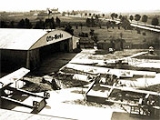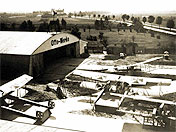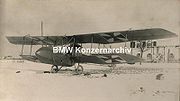
Otto-Flugzeugwerke
Encyclopedia
Gustav Otto Flugzeugwerke, founded in 1910 by Gustav Otto
, was one of the pioneering aircraft producers at the turn of the 20th Century. It was merged into BFW, the company that eventually became BMW AG.
 In 1910, Gustav Otto founded the "Aeroplanbau Otto-Alberti" workshop at the Puchheim
In 1910, Gustav Otto founded the "Aeroplanbau Otto-Alberti" workshop at the Puchheim
airfield, where Gustav, along with a few others, flew machines made of wood, wire, and canvas and were powered by an engine. Through their passion for these flying machines, they helped transform aviation from a do-it-yourself hobby to a genuine industry vital to the military, especially after the breakout of World War I. Interestingly, Ernst Udet
, the second highest scoring German flying ace of World War I (second only to the Red Baron
), earned his pilots license from private training with Gustav during this time.
moved the workshop from its original location at 37 Gabelsberger Strasse to new premises at 135 Schleissheimer Strasse.
 In 1914 construction started on a new factory at 76 Neulerchenfeldstrasse (later Lerchenauer Strasse). Gustav moved the company to the new factory on Lerchenauer Strasse just east of the Oberwiesenfeld troop maneuver area in the Milbertshofen district of Munich
In 1914 construction started on a new factory at 76 Neulerchenfeldstrasse (later Lerchenauer Strasse). Gustav moved the company to the new factory on Lerchenauer Strasse just east of the Oberwiesenfeld troop maneuver area in the Milbertshofen district of Munich
(This area later became Munich's first airport). He wanted to be closer to the German government's procurement process for military sale. In 1915, the company is again renamed to "Gustav Otto Flugzeugwerke". Shortly thereafter, Otto established another company named AGO Flugzeugwerke
at Berlin
's Johannisthal Air Field.
While the designs by Gustav Otto were initially successful, he was continually experiencing problems related to cost-effective production, as well as generating profits. At the start of the war, Otto-Flugzeugwerke was supplying the German Air Force, but as the war progressed so did production problems. Eventually, the government agencies urged the company to nationalize its production. The stress of wartime and ongoing financial problems with the company proved too great a burden for Gustav, who suffered health issues. At the insistence of the Bavarian
and Prussian War Ministries
(and in particular the Inspectors of the Engineering Corps) the unprofitable aircraft manufacturer was taken over by the German Government, and Gustav Otto was forced to resign from his company. A consortium of banks took over the assets of the company and incorporated them into Bayerische Flugzeugwerke AG on 19 February 1916.
Gustav Otto turned his attention to Otto-Werke Flugzeug-und Maschinenfabrik GmbH, which was founded (1 February 1916) just prior to Otto-Flugzeugwerke being taken over by the consortium. The two companies were not connected in any way.
In the summer of 1916 13 Otto C.I twin-boom aircraft were delivered to the Bulgarian Air Force [3].
Gustav Otto
Gustav Otto was a German aircraft and aircraft-engine designer and manufacturer.Otto was born in Cologne to Nikolaus August Otto, the founder of N. A. Otto & Cie. and inventor of the four-stroke internal combustion engine...
, was one of the pioneering aircraft producers at the turn of the 20th Century. It was merged into BFW, the company that eventually became BMW AG.

Puchheim
Puchheim is a city near Munich in the district of Fürstenfeldbruck, in Bavaria, Germany. It has about 20,000 inhabitants, and is located at .Puchheim is divided into two parts: the old and rural part called Puchheim-Ort and the new part of Puchheim that was founded when the S-Bahn was built....
airfield, where Gustav, along with a few others, flew machines made of wood, wire, and canvas and were powered by an engine. Through their passion for these flying machines, they helped transform aviation from a do-it-yourself hobby to a genuine industry vital to the military, especially after the breakout of World War I. Interestingly, Ernst Udet
Ernst Udet
Colonel General Ernst Udet was the second-highest scoring German flying ace of World War I. He was one of the youngest aces and was the highest scoring German ace to survive the war . His 62 victories were second only to Manfred von Richthofen, his commander in the Flying Circus...
, the second highest scoring German flying ace of World War I (second only to the Red Baron
Manfred von Richthofen
Manfred Albrecht Freiherr von Richthofen , also widely known as the Red Baron, was a German fighter pilot with the Imperial German Army Air Service during World War I...
), earned his pilots license from private training with Gustav during this time.
Gustav Otto Flugmaschinenfabrik
In 1911 Gustav moved the company and renamed it "Gustav Otto Flugmaschinenfabrik". The official entry appears as No. 14/364: "Gustav Otto in Munich, flying machine factory, office at 72 Karlstrasse." Shortly afterwards, Ottomoved the workshop from its original location at 37 Gabelsberger Strasse to new premises at 135 Schleissheimer Strasse.

Munich
Munich The city's motto is "" . Before 2006, it was "Weltstadt mit Herz" . Its native name, , is derived from the Old High German Munichen, meaning "by the monks' place". The city's name derives from the monks of the Benedictine order who founded the city; hence the monk depicted on the city's coat...
(This area later became Munich's first airport). He wanted to be closer to the German government's procurement process for military sale. In 1915, the company is again renamed to "Gustav Otto Flugzeugwerke". Shortly thereafter, Otto established another company named AGO Flugzeugwerke
AGO Flugzeugwerke
AGO Flugzeugwerke was a German aircraft manufacturing company from 1941 until 1945. The initials AGO had a variety of meanings during the company's lifetime, but in the its final version stood for Apparatebau GmbH Oschersleben...
at Berlin
Berlin
Berlin is the capital city of Germany and is one of the 16 states of Germany. With a population of 3.45 million people, Berlin is Germany's largest city. It is the second most populous city proper and the seventh most populous urban area in the European Union...
's Johannisthal Air Field.
While the designs by Gustav Otto were initially successful, he was continually experiencing problems related to cost-effective production, as well as generating profits. At the start of the war, Otto-Flugzeugwerke was supplying the German Air Force, but as the war progressed so did production problems. Eventually, the government agencies urged the company to nationalize its production. The stress of wartime and ongoing financial problems with the company proved too great a burden for Gustav, who suffered health issues. At the insistence of the Bavarian
Ministry of War (Kingdom of Bavaria)
The Ministry of War was a ministry for military affairs of the Kingdom of Bavaria, founded as Ministerium des Kriegswesens on October 1, 1808 by King Maximilian I Joseph of Bavaria. It was located at Ludwigstraße in Munich...
and Prussian War Ministries
Prussian Minister of War
The Prussian War Ministry was gradually established between 1808 and 1809 as part of a series of reforms initiated by the Military Reorganization Commission created after the disastrous Treaty of Paris. The War Ministry was to help bring the army under constitutional control, and, along with the...
(and in particular the Inspectors of the Engineering Corps) the unprofitable aircraft manufacturer was taken over by the German Government, and Gustav Otto was forced to resign from his company. A consortium of banks took over the assets of the company and incorporated them into Bayerische Flugzeugwerke AG on 19 February 1916.
Gustav Otto turned his attention to Otto-Werke Flugzeug-und Maschinenfabrik GmbH, which was founded (1 February 1916) just prior to Otto-Flugzeugwerke being taken over by the consortium. The two companies were not connected in any way.
In the summer of 1916 13 Otto C.I twin-boom aircraft were delivered to the Bulgarian Air Force [3].

